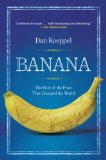Summary | Excerpt | Reviews | Beyond the Book | Readalikes | Genres & Themes | Author Bio

Critics' Opinion:
Readers' Opinion:
First Published:
Jan 2008, 304 pages
Paperback:
Jan 2009, 304 pages
 Book Reviewed by:
Book Reviewed by:
Paul Hughes
Buy This Book
CHAPTER 1
And God Created the Banana
IF THERE IS AN ANSWER TO PANAMA DISEASE, it begins further back than even
the earliest recorded history. It starts in myth. It starts when people—and
bananas—were born.
It is humanity's oldest story. There's probably not a single person you
know who isn't familiar with it. The odds, however, are also good that
nobody—not you, me, or perhaps even your local pastor—has gotten it quite
right.
In the beginning, God spent a week creating heaven and earth. Fruit
appeared on day two. Man arrived after the sixth dawn. After resting, God
created a companion for his progeny, and Adam and Eve became a couple. Their
Eden was a classic utopia. Everything was there in abundance, for the
taking, with a significant exception: "You may freely eat of every tree in
the garden," God said, "but of the tree of knowledge of good and evil you
shall not eat, for in the day that you eat it, you shall die."
When she encounters the snake, Eve, being Eve, is easily convinced that
the prohibited fruit is not poison, but a source of power selfishly guarded
by God. A taste confirms it: "The tree was good for food," the Bible says,
"and a delight for the eyes." The first woman shares with her mate, and
Adam, also, doesn't perish. Instead, the couple realizes that they're naked,
and they fashion clothes from leaves. God discovers the transgression…you
know the rest. Common wisdom holds that Eve's temptation was an apple, a
piece of which lodged itself in Adam's throat, giving that particularly male
anatomic feature its name.
The apple is so prominent in the Western world's collective imagining of
Eden that it came as quite a surprise when I learned, while researching this
book, that many of the most ancient biblical texts, written in Hebrew and
Greek, never identified the fruit as such. That now-common representation
emerged around AD 400, when Saint Jerome, patron saint of archaeologists,
librarians, and students, created the Vulgate Bible, a version of the book
that united the older texts into a cohesive Latin form. Jerome's
work—conducted in Rome at the behest of Pope Damasus I—was one of the first
to make scripture available to a wider audience. Over the next six
centuries, other translations of the Bible began to appear. Then, in 1455,
Johannes Gutenberg invented movable type and published the first
mass-produced edition of the Bible. Gutenberg's Bible was a close
transcription of Jerome's millennium-old volume, in the original Latin.
Like English, Latin is a language that contains many homonyms—words that
sound alike, but have different meanings. When Jerome translated the Hebrew
description of Eden's "good and evil" fruit, he chose the Latin word
malum, which, according to biblical archaeologist Schneir Levin, was
intended to mean something similar to "malicious." Malum also can be
translated as "apple," however, derived from a Greek word for the fruit,
melon. When Renaissance artists referred to their Gutenberg bibles, they
took the term to be a reference to the fruit—and began painting apples into
their Gardens of Eden.
NOT EVERYONE INTERPRETED the term that way, though. Over the
centuries, scholars outside of Renaissance Europe asserted that the
identification should have been the banana.
Among these scholars was Swedish scientist Carolus Linnaeus, father of
modern taxonomy. Early in the eighteenth century, Linnaeus made two entries
for the fruit in his Systema Naturae, a seminal catalogue of over
four thousand species of fauna and seven thousand kinds of plant life. A
deeply religious man, Linnaeus saw his work as no less than creating a
complete inventory of God's creation. He both believed in Eden and that the
banana belonged there. The scientific name he gave to the sweet, yellow
banana was Musa sapentium, from a Latin term meaning "wise" (as in
the tree of knowledge). The green banana—our plantain—was called Musa
paradisiaca, "the banana of paradise."
Reprinted by arrangement with Hudson Street Press, a member of Penguin Group (USA) Inc., from Banana by Dan Koeppel. Copyright © Dan Koeppel, 2008.





The Funeral Cryer by Wenyan Lu
Debut novelist Wenyan Lu brings us this witty yet profound story about one woman's midlife reawakening in contemporary rural China.
Your guide toexceptional books
BookBrowse seeks out and recommends the best in contemporary fiction and nonfiction—books that not only engage and entertain but also deepen our understanding of ourselves and the world around us.